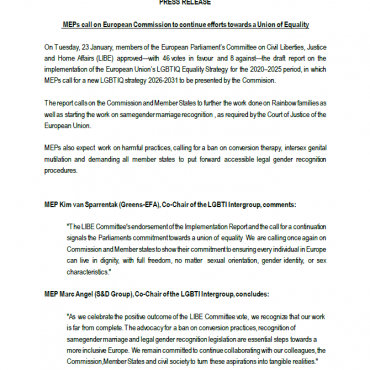EU law to protect victims of crime due to sexual orientation, gender identity or gender expression
Today the European Parliament agreed on a new Directive on the rights guaranteed to victims of crime in the EU. Notably, it provides specific assistance and protection to people who suffered crime because of their sexual orientation, gender identity or gender expression.
 The Directive of the European Parliament and of the Council establishing minimum standards on the rights, support and protection of victims of crime now says victims should receive appropriate assistance and protection.
The Directive of the European Parliament and of the Council establishing minimum standards on the rights, support and protection of victims of crime now says victims should receive appropriate assistance and protection.
This will be determined on the basis of “the personal characteristics of the victim such as his or her age, gender and gender identity or expression, ethnicity, race, religion, sexual orientation, health, disability, residence status, communication difficulties, relationship to or dependence on the offender and previous experience of crime.”
It is the first time EU law mentions gender expression.
While sexual orientation defines a person’s attraction to others, gender identity is understood as someone’s deeply felt internal and individual experience of gender, which may or may not correspond with the sex assigned at birth*. Gender expression is the way someone expresses their gender, including dress, speech and mannerisms*.
Antonyia Parvanova MEP, who co-authored the report (pictured, right), commented: “I am proud that the Parliament agreed certain victims of crime—such as women, children, or LGBTI people—deserve particular attention and should be entitled to specific protection measures, based on their needs. The parliament has been united behind this suggestion, and stood firm in convincing Member States in the Council of the European Union to accept it too.”
Michael Cashman MEP, Co-president of the European Parliament’s Intergroup on LGBT Rights, added: “Today the European Union sends a strong signal that victims of hate crime deserve special attention. All these victims, as well as their friends and families, know how devastating hate crime can be. It is Europe’s responsibility to protect them.”
EU Member States will now have three years to transpose the Directive into their national law.
Read more:
* : Definitions of these terms can be found in the Yogyakarta Principles.






